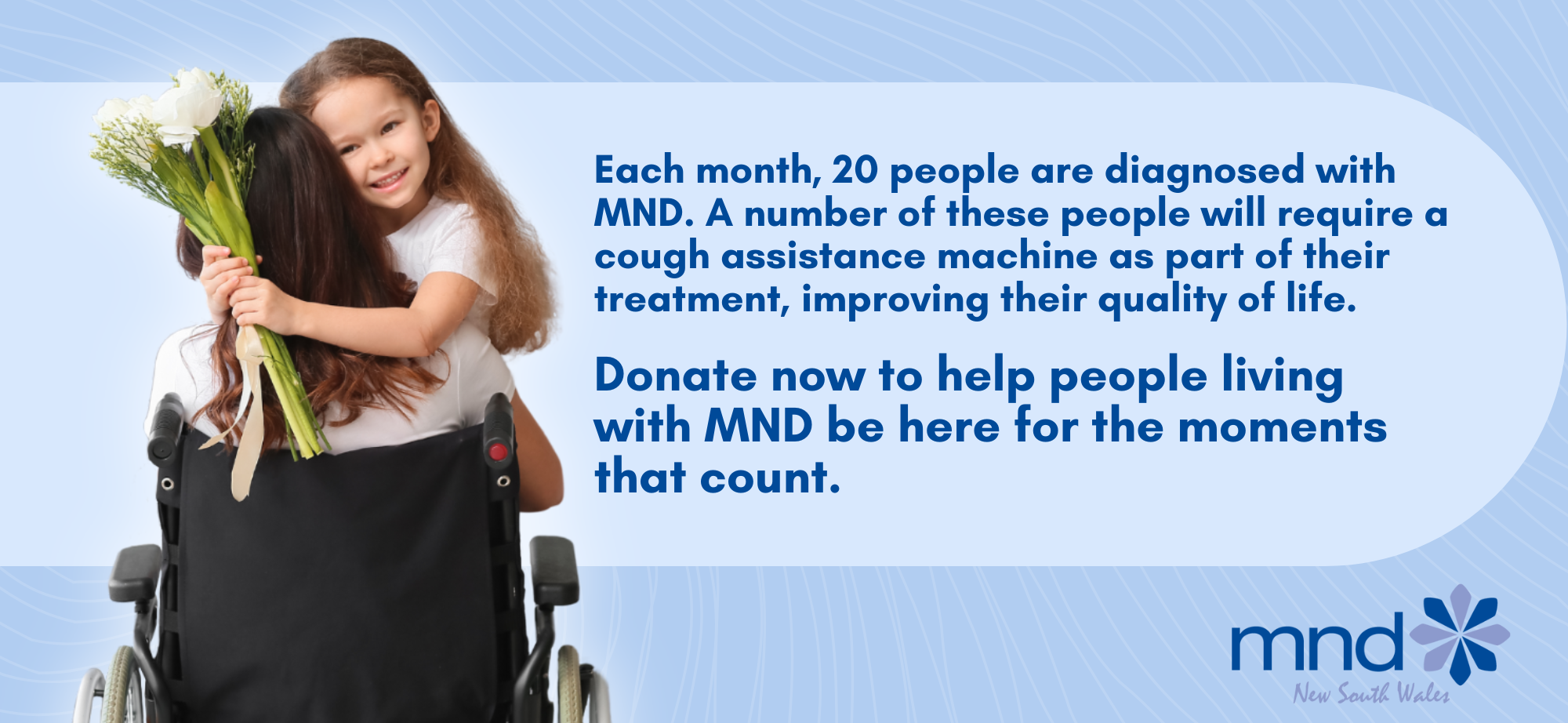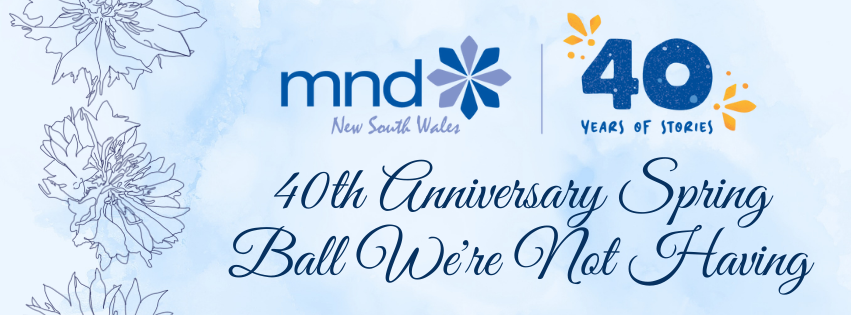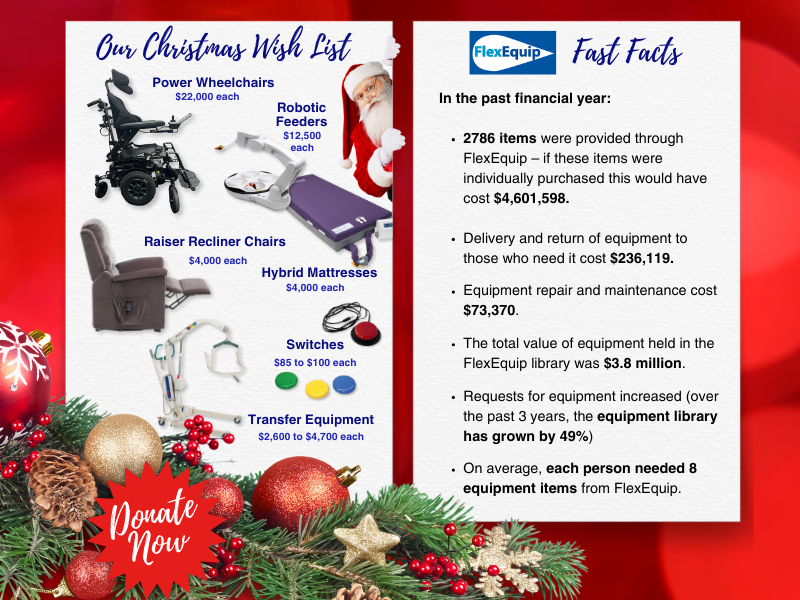Notice of the Motor Neurone Disease NSW AGM to be held Tuesday 29 October 2024 at 5.30pm.
Thank you for your support.
We urgently need your assistance to provide cough assistance machines to people living with MND across NSW, the ACT and NT. Your donation will give people facing MND the assistance they desperately need to be with their loved ones longer - and every moment counts when you are battling a disease with no cure.
A single cough assistance machine costs $10,000, or up to $600 per month to rent - unfortunately often well beyond the financial means of those who need it. Without MND NSW loaning this equipment free of charge or as part of an NDIS plan, people living with MND are at risk of lung infections, choking, and early death.
Stephanie van Hilten has been a respiratory physiotherapist for 34 years, working in many areas of the cardiothoracic specialty - intensive care, surgical, cardiac, rehabilitation, sleep and neuromuscular disorders. In 2021 she moved solely into the community space where she sees patients in her clinic and in their homes - many of those home visits are to people living with motor neurone disease.
Stephanie has seen first-hand the difference that a cough assistance machine can make to people living with MND.
“I asked one of my ladies living with MND how her access to a cough assist device has impacted her. She told me she felt if she hadn't been using a cough assist device for the past year, that she would not still be alive today. She is a single parent with four daughters, so every day with her beautiful children is precious. She has NDIS funding which has assisted in the cost involved in hiring this device, without that funding, her access to the device would be difficult and this may well have affected her longevity.”
“A cough assist device is life-changing for those with MND who struggle with secretions. Imagine having secretions and not being able to clear them. A constant feeling of choking,” she said.
“To have access to a cough assist device can be life-changing and life extending. Some people using a cough assist device may need to use this device 6 or more times a day to clear retained secretions. Just one day without clearing those secretions can lead to a life threatening lung infection.”
“Supporting this appeal will help to provide access to vital equipment that can help improve the quality and duration of a person living with MND. This disease is cruel and those affected struggle on a daily basis. Anything that helps to improve their function, extend their life and ease that struggle in any way should be accessible to all regardless of age and funding.”
With your help, we can ensure people who are experiencing MND can get the equipment they need.
Find out why cough assistance machines are so important for people living with MND here.
PARTICIPANT INFORMATION SHEET
Carer to Carer Support Project
Experienced Carer
Invitation
You are invited to participate in a research study designed to support people who look after a relative or friend who has been diagnosed with motor neurone disease. The purpose of the study is to bring together an experienced carer who has lost their person with MND, with a carer of a recently diagnosed person.
The project is being conducted by the Education and Carers Team Leader Dr. Sabine Krajewski (mobile: 0403 651 202) and Education and Carers Coordinator Kath Teesson of Motor Neurone Disease NSW.
Before you decide whether or not you wish to participate in this study, it is important for you to understand why the research is being done and what it will involve. Please take the time to read the following information carefully and discuss it with others if you wish.
1. ‘What is the purpose of this study?’
The purpose is to investigate whether matching an experienced carer who has lost a loved one to MND with a person who is currently a carer for someone diagnosed with MND is beneficial to all involved.
2. ‘Why have I been invited to participate in this study?’
You are eligible to participate in this study because you have lost a loved one with MND in the past 7 years; you have been the main carer or one of the main informal carers for that person; you expressed interest in helping others affected by the disease.
3. ‘What if I don’t want to take part in this study, or if I want to withdraw later?’
Participation in this study is voluntary. It is completely up to you whether or not you participate. Whatever your decision, it will not affect your relationship with MND NSW.
If you wish to withdraw from the study once it has started, you can do so at any time without having to give a reason.
4. ‘What does this study involve?’
If you agree to participate in this study, you will be asked to sign the Participant Consent Form.
This study will be conducted over 2 years. Your involvement in the study will be based on an agreement you will make with the carer you are willing to support. You may decide to be in contact on a regular basis, for example by scheduling a weekly phone call, or by zooming once a month. Before we can match you with a current carer, we will provide you with a brief training manual and a code of conduct form. The current carer will also get a code of conduct form so that everyone is clear about expectations, appropriate means of contact and privacy issues. You will also be asked to fill in a questionnaire about your own experience as a carer and your expectations regarding this project. You may also be invited to participate in an online focus group to share your experience in the carer to carer project with other experienced carers. Again, your participation in focus groups is completely voluntary and you can opt out if you wish to do so without consequence.
5. ‘How is this study being paid for?’
The carer to carer project is funded through an NDIS Information Linkages and Capacity Building (ILC) grant awarded to MND NSW.
No money is paid directly to individual researchers.
6. ‘Are there risks to me in taking part in this study?’
There is a possibility that participation causes emotional stress for the experienced carer. Supporting a current carer may make you relive your own journey and cause distress and grief. You may also experience emotional stress if you feel that you cannot support your carer to the degree you would like to.
7. ‘What happens if I suffer distress as a result of the study?’
If you suffer any emotional distress a result of this study, you should contact the study coordinator who will assist you in arranging appropriate counselling.
8. ‘Will I benefit from the study?’
This study aims to further improve support for those who care for a person with MND and, in turn to support people with the disease. Participation may not directly benefit you, although it may be extremely rewarding for you to be able to use your expertise to help a carer in need of support.
9. ‘Will taking part in this study cost me anything, and will I be paid?
Participation in this study will not cost you anything. MND NSW is a not-for-profit organisation that is mainly funded through the generosity of the community, people like you who generously give their time to support people with MND.
10. ‘How will my confidentiality be protected?’
Only the Education and Carers team of MND NSW will know that you are participating in this study. Any identifiable information that is collected about you in connection with this study will remain confidential and will be disclosed only with your permission, or except as required by law. Only the researchers named above will have access to the data you provide (in the questionnaires). If you decide to join a focus group, other experienced carers will share their views with you and you will share with them.
11. ‘What happens with the results?’
If you give us your permission by signing the consent document, we plan to discuss/publish the results in a peer-reviewd academic journal, so that the project may be replicated by other institutions.
In any publication, information will be provided in such a way that you cannot be identified. Results of the study will be provided to you, if you wish.
12. ‘What should I do if I want to discuss this study further before I decide?’
When you have read this information, the project coordinator, Kath Teesson, will discuss it and any queries you may have with you. If you would like to know more at any stage, please do not hesitate to contact us at
13. ‘Who should I contact if I have concerns about the conduct of this study?’
This study has been approved by the Northern Sydney Local Health District HREC. Any person with concerns or complaints about the conduct of this study should contact the Research Office who is nominated to receive complaints from research participants. You should contact them on 02 9926 4590 and quote HREC reference number.
Thank you for taking the time to consider this study.
Program
Embracing Change
9.30 Registration and Refreshments
10.00 Acknowledgement of Country and Welcome to the Workshop - Anita Richter (MND NSW Board Member)
10.15 ‘FlexEquip – Challenges and Changes’ - Alicia Gibb
Alicia Gibb commenced in the role of FlexEquip Team Leader at MND NSW in January 2022. Prior to her current position she was a community Occupational Therapist at Liverpool Hospital for over 14 years working in chronic and complex care with people with progressive neurological conditions. Alicia previously provided expertise within the Liverpool Hospital Communication and Assistive Technology Clinic, Motor Neurone Disease clinic and within the chronic and complex community team. She has many years of experience in the prescription of complex equipment and applying for funding through a range of funding bodies. She has presented at National and International MND conferences.
10.30 ‘Flexibility and working together in the NT’ - Julie Bromley
Julie Bromley is an Occupational Therapist with a Bachelor of Occupational Therapist, Masters of Public Health, Diploma of Leadership and Management as well as Graduate Certificate of Disability Studies. Julie has worked with NT Health for the past 14 years in the Aged and Disability sector with a strong focus on assistive technology and home modifications. Julie is the Team Leader for the Territory Equipment Program in the Top End as well as the SEAT Service, managing the day-to-day operations of these units as well as being an active member of the Community Allied Health and Aged Care Services Leadership team. Julie grew up in the NT and has sound working knowledge of the NT, its population and the challenges faced by Territorians and in particular the health system. Julie is passionate about working with others to support Territorians, ensuring that regardless of their location their equipment needs are met as much as possible and in a timely and efficient manner. Julie enjoys the challenge of each and every day with NT Health, with no two days the same and being able to problem solve and think outside the box for creative solutions. Julie also enjoys being able to collaborate and work with a wide range of clients, carers, significant others and health professionals, breaking down ‘silos’ and encouraging an environment of flexibility and collaboration.
10.45 ‘Cough assist’ - Ana Schippers
Ana Schippers is a Senior physiotherapist in Non-Invasive Ventilation. She has worked as respiratory physiotherapist for over 20 years and recently secured funding to commence a Community Neurodegenerative Disease Supportive Care Service for South Western Sydney Local Health Service commencing July 2022. She presented a poster at the European Respiratory Congress Vienna 2012 on “The Effectiveness of a home-based Pulmonary Rehabilitation Program (PRP) in people with COPD”
11.00 ‘Eye gaze’ - Monique Signorelli and Manasi Thornley
Monique Signorelli graduated as a Speech Pathologist from The University of Sydney in 2009. She has worked with clients who have neurological and neurodegenerative conditions for over 12 years. Monique has a special interest in MND and provides clinical expertise to clients within the community, Liverpool Hospital’s MND Clinic and South-West Sydney’s Communication and Assistive Technology (CAT) Clinic. She is involved in MND research and has presented at national and international conferences.
Manasi Thornley graduated in 2000 from University of Western Sydney and has been working with clients with MND for 20 years. She provides expertise within the MND clinic and Communication and Assistive Technology clinic at Liverpool Hospital. Manasi has keen interest in the holistic Occupational Therapy Assessment and Intervention of MND clients in the community. Monique graduated as a Speech Pathologist from The University of Sydney in 2009. She has worked with clients who have neurological and neurodegenerative conditions for over 12 years. Monique has a special interest in MND and provides clinical expertise to clients within the community, Liverpool Hospital’s MND Clinic and South West Sydney’s Communication and Assistive Technology (CAT) Clinic. She is involved in MND research and has presented at national and international conferences.
11.15 Panel Q&A
11.25 Morning Tea
11.35 ‘Integrated models of care in MND’ - Karen Hutchinson
Dr Karen Hutchinson is a Postdoctoral Research Fellow with the Australian Institute of Health Innovation at Macquarie University. She is a qualitative and mixed method health care researcher with a particular interest in lived experiences, implementation science and integrated models of health care. She is currently conducting implementation evaluations of integrated models of care with children living with medical complexity and motor neurone disease. She is also a physiotherapist with many years of clinical experience working with adults and their families living with complex and chronic neurological conditions.
11.50 ‘Arts in Health - A Tool for Clinical Care’ - Danielle Gullotta
Danielle Gullotta is Senior Access Programs Producer at the Art Gallery NSW. She has been leading the growth and development of the AGNSW’s range of inclusive Access programs since 2008. Danielle has been creating opportunities for individuals to imagine and think creatively about art in a safe environment where curiosity is stimulated with open-ended outcomes for engaging a wide and diverse range of children and adults with specific needs. Danielle has been an advocate for the positive benefits of engagement in the arts, for the education, health, ageing and disability sectors. Audiences are increasingly viewing the Gallery environment as a public space, which provides opportunities for stimulating and inspiring experiences for a diverse range of people, including individuals living with mental health conditions and dementia. Art is used to facilitate personal connections, meaningful social interactions and an immersion into visual culture.
12.05 ‘Palliative Care and MND - when is the right time to refer?’ - Sally Carr
Dr Sally Carr is a UK trained palliative care specialist and has been working as a Staff Specialist with the Central Coast Local Health District since 2006 having previously spent some time working in Australia in the late 1990s. She has been the Director of Central Coast Palliative Care Services since 2018. When not working she is either playing hockey herself or cheering her daughters from the sidelines at hockey, league tag and soccer.
12.20 ‘A client journey- insights from the ACT MND Clinic Team’ - Megan Sullivan
Megan Sullivan works in the Brindabella Day and Ambulatory Service, a part of Canberra Health Services and based at the University of Canberra Hospital. In her role as Rehabilitation Coordinator she is responsible for optimising provision of clinical care. An important component of her role is coordination of the ACT Motor Neurone Disease Clinic. Prior to her current position, she spent over 10 years working as a physio in the Rehabilitation services in Canberra. She has been involved with MND clients since the start of the MND clinic approximately 10 years ago and made some special connections with some of the MND population over the years. She feels privileged to be part of their journey. When not working, Megan enjoys hanging out with her husband and 2 kids, sharing meals with friends and camping near the beach with family including dog Nala.
12.35 Panel Q&A
12.45 Lunch
13.15 Please Ask!
Stephen Thwaites
Timothy Gibson
13.45 Break and Afternoon Tea
13.55 Demos
Room 1: Positioning (Kate Pain)
Kate Pain is an Occupational Therapist who is working as Assistive Technology Consultant with GTK. She completed her Bachelor of Applied Science (Occupational Therapy) at the University of Sydney in 1999 and has gained experience in a variety of settings including hospitals, rehabilitation units, community and private practice. Kate has focused on wheelchair seating and positioning for children and adults with complex postural support and pressure care requirements over the past decade. Kate is passionate about building the knowledge and skills of health professionals in postural care in relation to wheelchair seating and across the 24-hour period.
Room 2a: Eye gaze and Mounting (Monique, Manasi, Alicia)
See bios above
Room 2b: Mounting phones, ipad, switches (Communicate AT and Fiona Barry
Fiona Barry is an Occupational Therapist at St Joseph’s Hospital (SJH) and has worked with the Motor Neurone Disease Clinic service for 10 + years. SJH Communication and Technology clinic was established in 2015 to support the needs of clients living with progressive neurological conditions including MND.
Room 3: Cough assist (Philips, Ruth Patterson from Mel, Ben Greenway for Pegasso)
Room 4: Arts in Health - A Tool for Clinical Care (Danielle Gullotta; PAUSE)
See bios above
16.00 Evaluation then Networking Session (in bar downstairs)
Please complete the workshop evaluation: https://sforce.co/3zlmodW
17.00 Close
PARTICIPANT INFORMATION SHEET
Carer to Carer Support Project
Current Carer
Invitation
You are invited to participate in a research study designed to support people who look after a relative or friend who has been diagnosed with motor neurone disease. The purpose of the study is bring together an experienced carer who lost their person with MND, with a carer of a recently diagnosed person.
The project is being conducted by the Education and Carers Team Leader Dr. Sabine Krajewski (mobile: 0403 651 202) and Education and Carers Coordinator Kath Teesson of Motor Neurone Disease NSW.
Before you decide whether or not you wish to participate in this study, it is important for you to understand why the research is being done and what it will involve. Please take the time to read the following information carefully and discuss it with others if you wish.
1. ‘What is the purpose of this study?’
The purpose is to investigate whether matching an experienced carer who has lost a loved one to MND with a person who is currently a carer for someone diagnosed with MND is beneficial to all involved.
2. ‘Why have I been invited to participate in this study?’
You are eligible to participate in this study because you are caring for a person who has recently been diagnosed with MND; you are the main carer or one of the main informal carers for that person; you expressed interest in helping others affected by the disease.
3. ‘What if I don’t want to take part in this study, or if I want to withdraw later?’
Participation in this study is voluntary. It is completely up to you whether or not you participate. Whatever your decision, it will not affect your relationship with MND NSW.
If you wish to withdraw from the study once it has started, you can do so at any time without having to give a reason.
4. ‘What does this study involve?’
If you agree to participate in this study, you will be asked to sign the Participant Consent Form.
This study will be conducted over 2 years. Your involvement in the study will be based on an agreement you will make with the experienced carer who is going to support you. You may decide to be in contact on a regular basis, for example by scheduling a weekly phone call, or by zooming once a month. Before we can match you with an experienced carer, we will provide you with a code of conduct form. The experienced carer will get training and will also get a code of conduct form so that everyone is clear about expectations, appropriate means of contact and privacy issues. You will also be asked to fill in a questionnaire about your own experience as a carer and your expectations regarding this project.
5. ‘How is this study being paid for?’
The carer-to-carer project is funded through an NDIS Information Linkages and Capacity Building (ILC) grant awarded to MND NSW.
No money is paid directly to individual researchers.
6. ‘Are there risks to me in taking part in this study?’
There is a possibility that participation causes emotional stress for the current carer. Talking about difficult issues can be stressful at times.
7. ‘What happens if I suffer distress as a result of the study?’
If you suffer any emotional distress a result of this study, you should contact the study coordinator who will assist you in arranging appropriate counselling.
8. ‘Will I benefit from the study?’
This study aims to further improve support for those who care for a person with MND, like yourself, and, in turn, to support people with the disease.
9. ‘Will taking part in this study cost me anything, and will I be paid?
Participation in this study will not cost you anything. MND NSW is a not-for-profit organisation that is mainly funded through the generosity of the community, such as experienced carers who generously give their time to support people with MND.
10. ‘How will my confidentiality be protected?’
Only the Education and Carers team of MND NSW will know that you are participating in this study. Any identifiable information that is collected about you in connection with this study will remain confidential and will be disclosed only with your permission, or except as required by law. Only the researchers named above will have access to the data you provide (in the questionnaires).
11. ‘What happens with the results?’
If you give us your permission by signing the consent document, we plan to discuss/publish the results in a peer-reviewed academic journal, so that the project may be replicated by other institutions.
In any publication, information will be provided in such a way that you cannot be identified. Results of the study will be provided to you, if you wish.
12. ‘What should I do if I want to discuss this study further before I decide?’
When you have read this information, the project coordinator will discuss it and any queries you may have . If you would like to know more at any stage, please do not hesitate to contact us at
13. ‘Who should I contact if I have concerns about the conduct of this study?’
This study has been approved by the Northern Sydney Local Health District HREC. Any person with concerns or complaints about the conduct of this study should contact the Research Office who is nominated to receive complaints from research participants. You should contact them on 02 9926 4590 and quote HREC reference number.
Thank you for taking the time to consider this study.
DDR SERVICE AGREEMENT (Ver 1.8)
I/We hereby authorise Ezidebit Pty Ltd ACN 096 902 813 (Direct Debit User ID number 165969, 303909, 301203, 234040, 234072, 428198) (herein referred to as "Ezidebit") to make periodic debits on behalf of the "Business" as indicated on the attached Direct Debit Request (herein referred to as "the Business").
I/We acknowledge that Ezidebit is acting as a Direct Debit Agent for the Business and that Ezidebit does not provide any goods or services (other than the direct debit collection services to me/us for the Business pursuant to the Direct Debit Request and this DDR Service Agreement) and has no express or implied liability in regards to the goods and services provided by the Business or the terms and conditions of any agreement that I/we have with the Business.
I/We acknowledge that the debit amount will be debited from my/our account according to the terms and conditions of my/our agreement with the Business and the terms and conditions of the Direct Debit Request (and specifically the Debit Arrangement and the Fees/Charges detailed in the Direct Debit Request) and this DDR Service Agreement.
I/We acknowledge that bank account and/or credit card details have been verified against a recent bank statement to ensure accuracy of the details provided and I/we will contact my/our financial institution if I/we are uncertain of the accuracy of these details.
I/We acknowledge that is my/our responsibility to ensure that there are sufficient cleared funds in the nominated account by the due date to enable the direct debit to be honoured on the debit date. Direct debits normally occur overnight, however transactions can take up to three (3) business days depending on the financial institution. Accordingly, I/we acknowledge and agree that sufficient funds will remain in the nominated account until the direct debit amount has been debited from the account and that if there are insufficient funds available, I/we agree that Ezidebit will not be held responsible for any fees and charges that may be charged by either my/our or its financial institution.
I/We acknowledge that there may be a delay in processing the debit if:-
- there is a public or bank holiday on the day of the debit, or any day after the debit date;
- a payment request is received by Ezidebit on a day that is not a banking business day in Queensland;
- a payment request is received after normal Ezidebit cut off times, being 3:00pm Queensland time, Monday to Friday.
Any payments that fall due on any of the above will be processed on the next business day.
I/We authorise Ezidebit to vary the amount of the payments from time to time as may be agreed by me/us and the Business as provided for within my/our agreement with the Business. I/We authorise Ezidebit to vary the amount of the payments upon receiving instructions from the Business of the agreed variations. I/We do not require Ezidebit to notify me/us of such variations to the debit amount.
I/We acknowledge that Ezidebit is to provide at least 14 days' notice if it proposes to vary any of the terms and conditions of the Direct Debit Request or this DDR Service Agreement including varying any of the terms of the debit arrangements between us.
I/We acknowledge that I/we will contact the Business if I/we wish to alter or defer any of the debit arrangements.
I/We acknowledge that any request by me/us to stop or cancel the debit arrangements will be directed to the Business.
I/We acknowledge that any disputed debit payments will be directed to the Business and/or Ezidebit. If no resolution is forthcoming, I/we agree to contact my/our financial institution.
I/We acknowledge that if a debit is returned by my/our financial institution as unpaid, a failed payment fee of up to $11.90 is payable by me/us to Ezidebit. I/We will also be responsible for any fees and charges applied by my/our financial institution for each unsuccessful debit attempt together with any collection fees, including but not limited to any solicitor fees and/or collection agent fee as may be incurred by Ezidebit.
I/We authorise Ezidebit to attempt to re-process any unsuccessful payments as advised by the Business.
I/We acknowledge that certain fees and charges (including setup, variation, SMS or processing fees) may apply to the Direct Debit Request and may be payable to Ezidebit and subject to my/our agreement with the Business agree to pay those fees and charges to Ezidebit.
Credit Card Payments
I/We acknowledge that "Ezidebit" will appear as the merchant for all payments from my/our credit card. I/We acknowledge and agree that Ezidebit will not be held liable for any disputed transactions resulting in the non supply of goods and/or services and that all disputes will be directed to the Business as Ezidebit is acting only as a Direct Debit Agent for the Business.
I/We acknowledge that Credit Card Fees are a minimum of the Transaction Fee or the Credit Card Fee, whichever is greater as detailed on the Direct Debit Request.
I/We appoint Ezidebit as my/our exclusive agent with regard to the control, management and protection of my/our personal information (relating to the Business and contained in this DDR Service Agreement). I/We irrevocably authorise Ezidebit to take all necessary action (which Ezidebit deems necessary) to protect and/or correct, if required, my/our personal information, including (but not limited to) correcting account numbers and providing such information to relevant third parties and otherwise disclosing or allowing access to my/our personal information to third parties in accordance with the Ezidebit Privacy Policy.
Other than as provided in this Agreement or the Ezidebit Privacy Policy, Ezidebit will keep your information about your nominated account at the financial institution private and confidential unless this information is required to investigate a claim made relating to an alleged incorrect or wrongful debit, to be referred to a debt collection agency for the purposes of debt collection, or as otherwise required or permitted by law. Further information relating to Ezidebit's Privacy Policy can be found at http://www.ezidebit.com/au/privacy-policy/.
I/We hereby irrevocably authorise, direct and instruct any third party who holds/stores my/our personal information (relating to the Business and contained in this DDR Service Agreement) to release and provide such information to Ezidebit on my/our written request.
I/We authorise:
- Ezidebit to verify and/or correct, if necessary, details of my/our account with my/our financial institution; and
- my/our financial institution to release information allowing Ezidebit to verify my/our account details.
Will you support people living with MND in rural and regional areas?
But we cannot do this without your help.
MND NSW relies on your donations to ensure we can provide equipment, support information and education to those who need it. People living with motor neurone disease, their carers, families and healthcare professionals all receive support and training from MND NSW.
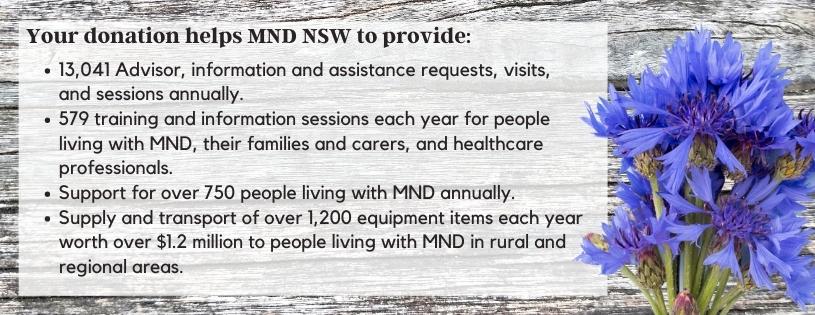
David's story
Living at Thrumster in Northern NSW, and keeping busy with work whilst battling MND, it would be close to impossible for David to continually travel to city centres where most services are offered. He's received calls and visits from MND NSW Advisors and Coordination of Support (COS) staff, and has online information and support sessions available for himself and his wife who is his carer, helping him and his family navigate his MND journey.
"Having the information and support groups available just opens your mind up to things that can happen along the way. My wife can also see a great need for joining online support groups," David said.
"Having these meetings online is really good - I'm on the bi-pap 20 hours a day, and I'm struggling to breathe sometimes, so to get out and about is difficult at times, being able to do those sorts of things online is very very helpful."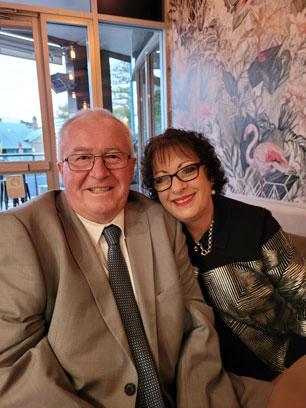
"We've got Jenny who is our MND COS and she is absolutely brilliant, she does so much for us, it's really really good. We had Eileen as our support person who has been to visit us a couple of times and I've met other staff members online. With COVID it has been difficult for them to get out and about, but they are doing a lot of things in the background to help us," David said.
David has fantastic healthcare locally, but it's the level of expertise and knowledge that MND NSW can offer that helps make a world of difference.
"I do have a very good community health team - palliative care, physios, OTs - but there's a lot of things the ladies from MND NSW know - tips and tricks, and particularly assistance dealing with NDIS, it's been really good having that help from Jenny and Eileen," he said.
"It (MND) is a unique disease that not a lot of people have, and something that the Government doesn't fund a great deal as far as I'm aware of. The quality of life is important to everybody, and the more donations we can get will really help and improve what MND NSW can offer, so people with this disease can have a sustainable lifestyle. It's those support services we really need," David said.
David said his employer has a Staff Giving program, and through this, he and his colleagues have been supporting MND NSW for a number of years - helping others nearby who have also had MND, and now himself and family too.
"It gives us that relief to know that we have someone behind us who can help us through this difficult period. The help is not just for the person with MND, its for people like my wife as well, who is my carer,” he said.
"You haven't had MND before - the staff at MND NSW have experience with others who have had motor neurone disease, so they know the things we require. As far as I’m concerned, they fight for our needs. MND NSW is a very needy service, and any donation we can get to go towards that is great."
Would you like to help David, and others living with motor neurone disease?
Donate now to make a difference for them and their families.
It’s the event of a lifetime that you don’t need to attend!
We’ve now been there for people living with MND for 40 years, and to mark the occasion, you’re invited to our 40th Anniversary Spring Ball We’re Not Having on September 4.
Yes, you read that correctly – not having.
By purchasing a ‘ticket’ for $80 (or more if you’re feeling generous!) not only will you earn yourself a relaxing night at home, but you’ll be helping us provide vital support and equipment to hundreds of people living with motor neurone disease.We’d also love to see what you’re getting up to on September 4 instead of attending another charity ball – so let us know on social media by tagging us and using the hashtag #MNDNSWSpringBall
Don’t miss out - take a look at your invitation and purchase your ‘ticket’ now!
Your ticket purchase includes:
• Assistance for the two people diagnosed with MND each day in Australia
• Provision of around 1,600 pieces of equipment to hundreds of people in NSW, NT and the ACT with MND and other progressive neurological conditions
• Purchase of equipment worth close to $2.4 million
• Freighting equipment to those who need it at a cost of $700,000 annually
• Support, education and information for people living with MND, as well as for their family and healthcare professionals
If you’d like to feel a little fancy while you’re relaxing at home during the 40th Anniversary Spring Ball We’re Not Having, we’ve got just the printables for you.
Choose from either a bowtie or corsage, and you’ll be dressed to impress!
Read more about the impact MND NSW has had on the lives of those affected by motor neurone disease over the past 40 years here
If you’d like to feel a little fancy while you’re relaxing at home during the 40th Anniversary Spring Ball We’re Not Having, we’ve got just the printables for you.
Choose from either a bowtie or corsage, and you’ll be dressed to impress!
Download print at home
Instructions:
1. Print onto paper or card, then cut out.
2. From the spare paper you’ve printed on, cut strips to attach to your bowtie or corsage.
3. Tape strips together to ensure a comfortable fit.
4. Attach one end of the strip/s to the back of your bowtie or corsage with tape.
5. Position corsage or bowtie, and then fasten other end of the strip/s to the back of your bowtie or corsage so it stays in place.
6. Enjoy, and also share a picture of you in your fancy attire with us – use the hashtag #MNDNSWSpringBall and tag us on socials!


Help us ensure people living with MND can get the equipment they need quickly, to meet their rapidly-changing needs. Your generous donation will be helping us add more power wheelchairs, robotic feeders, specialised chairs and mattresses, switches and transfer equipment to our FlexEquip equipment library to help improve quality of life for people with motor neurone disease, particularly those aged 65 and over.
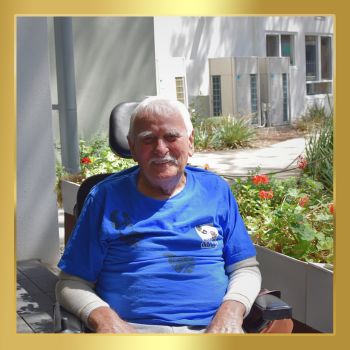
Bob's Story
Bob Pullen is one of the people living with motor neurone disease that we assist - providing him with a wheelchair to ensure he can still spend time with his family, participate in activities at his assisted living facility, and help maintain his independence and meet his everyday needs. You can read more about Bob and how FlexEquip has supported him during his MND Journey here.
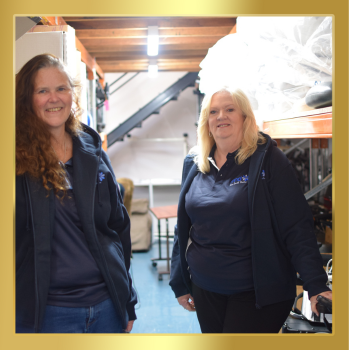
Meet our FlexEquip Team
Our FlexEquip Team are here to help the increasing number of people living with MND who need equipment for their everyday living.
Find out more about our team members Julie and Nicole, and how they assist people living with MND. Our FlexEquip Team Leader, Alicia, has also been presenting research conducted on FlexEquip and its services - find out how FlexEquip has benefited people living with MND over the past financial year here.




